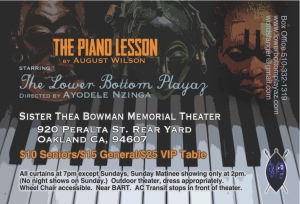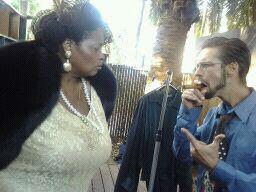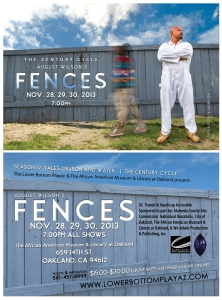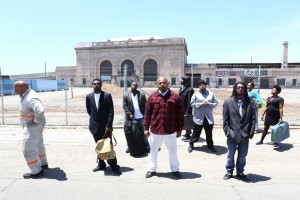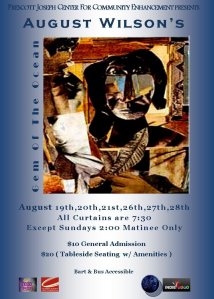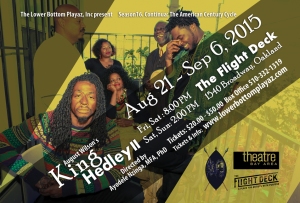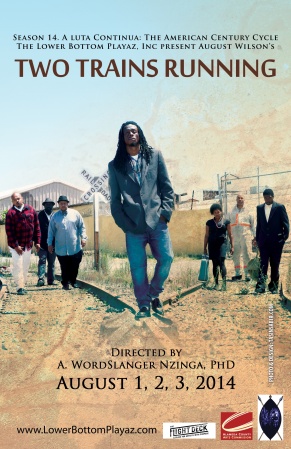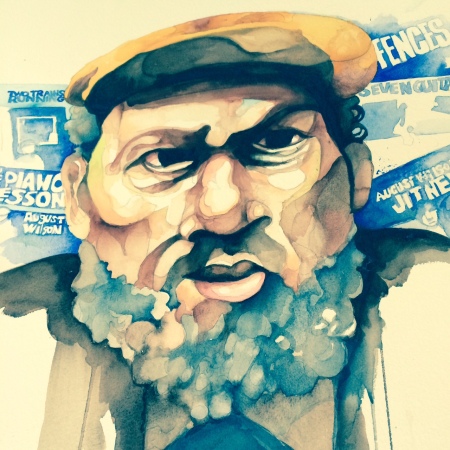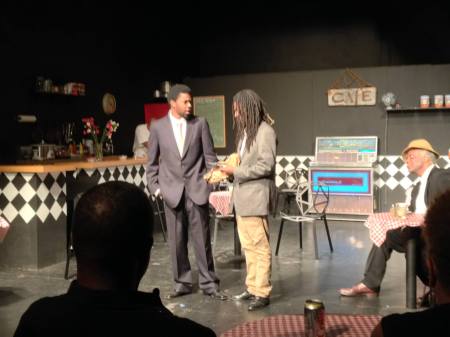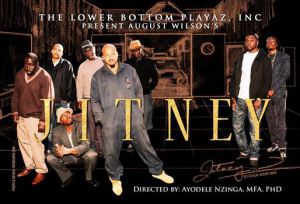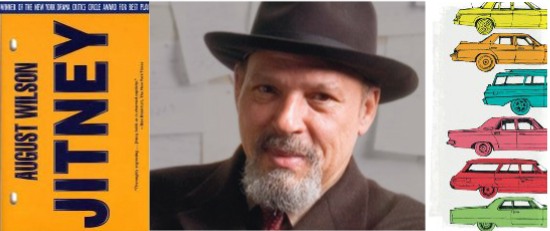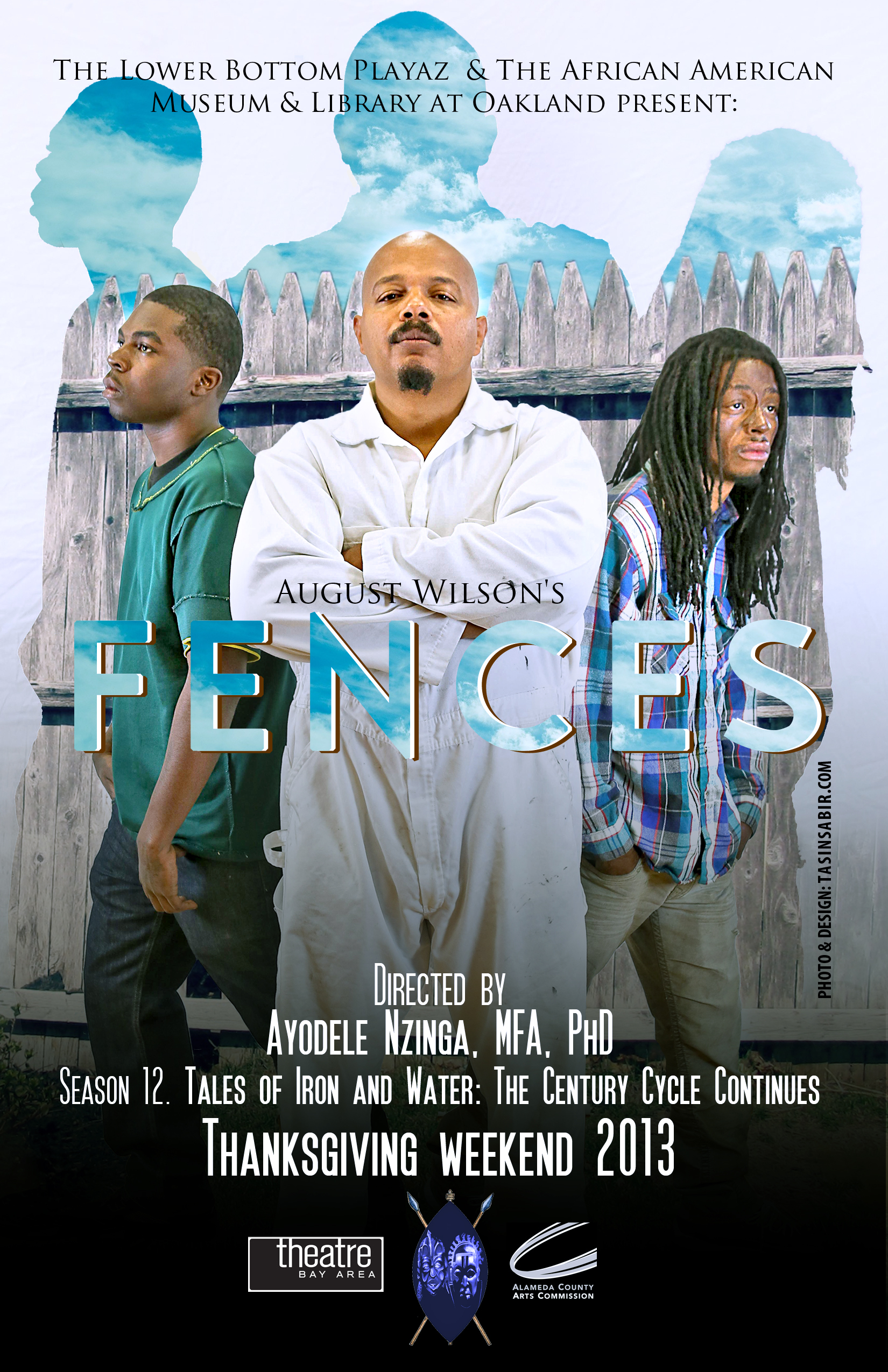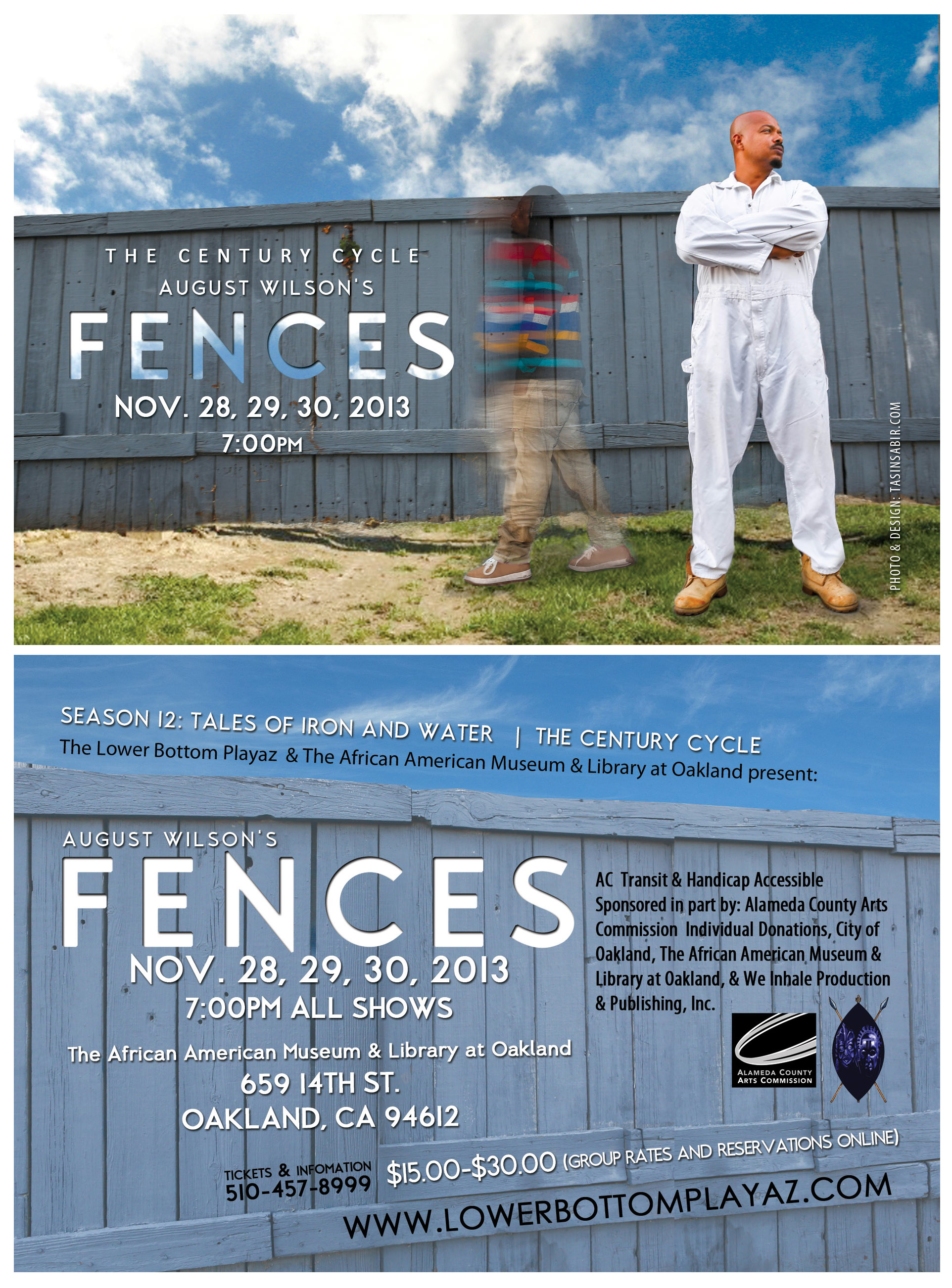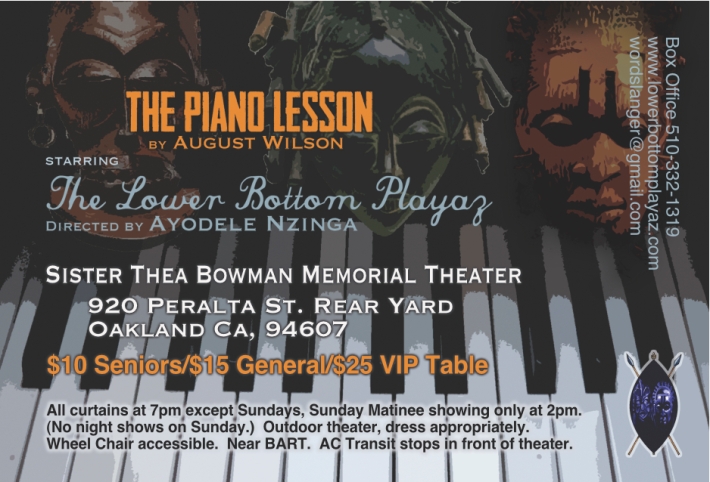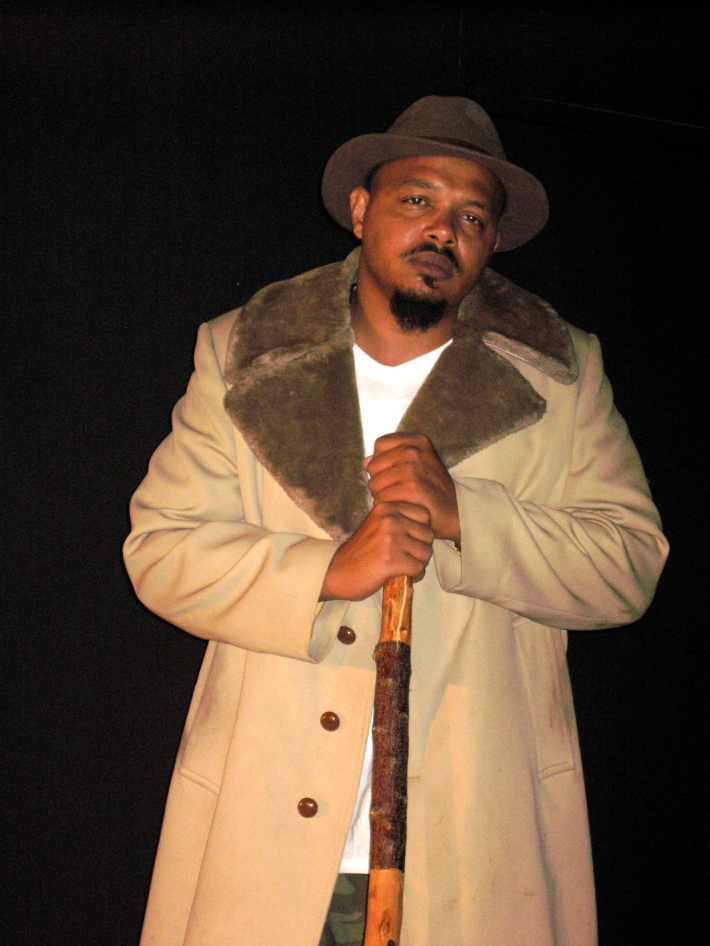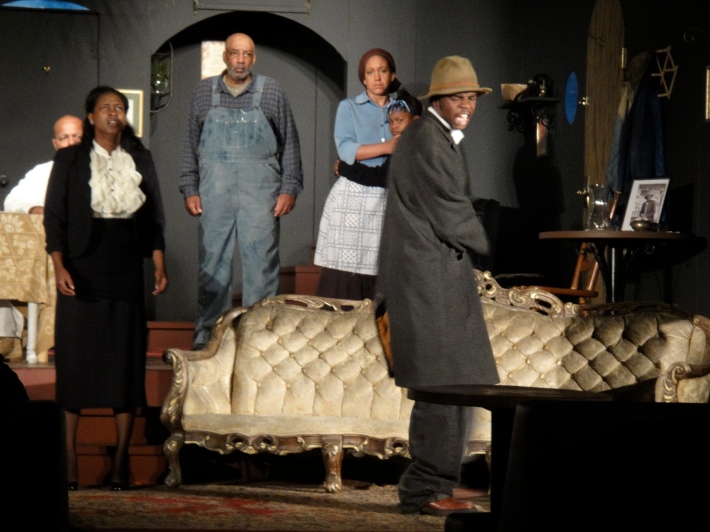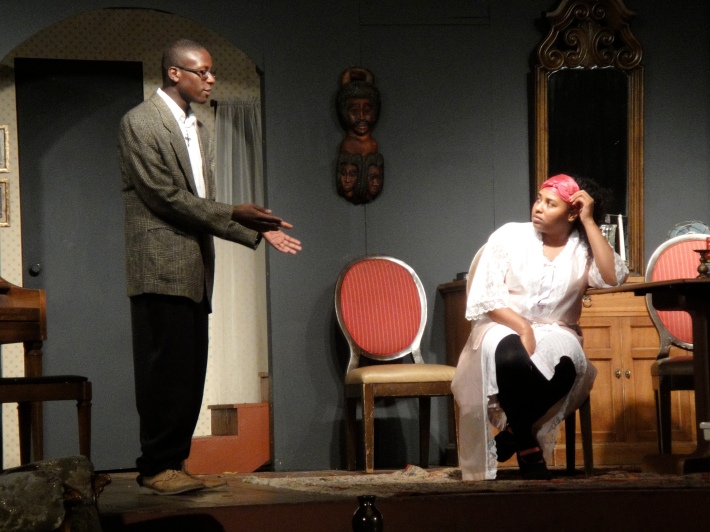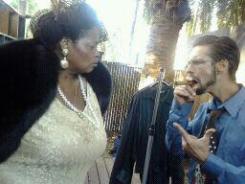To understand the end one must have an appreciation for the beginning. So as I begin production of Radio Golf by August Wilson I am compelled to look back over the American Century Cycle to the beginning. I met Caesar Wilks in Gem of the Ocean, the year was 2009 for me, however it was the year of our lord nineteen hundred and four for Caesar and the people in the sanctuary at 1839 Wylie St. So begins this tale of many parts, which is in fact the exploration of a group of tales collectively called, The American Century Cycle.
When one sets out on a quest, which includes the enactment of a ritual, one expects to know more about the thing at the end. Imagine cresting the final hill to see the place you began come into view. It turns out that Wilson’s Cycle is circular. We end on the part of the battlefield on which we entered the fray. Here it is we will find our harvest, here is where we will become victorious in our perfect understanding, or here we lose the sense of the song Wilson has been trying to help us remember.
I played Aunt Ester Tyler in Gem of the Ocean. I learned not to be afraid to remember. Memory serves me now as I shape this tale of Caesar Wilks and invite it to inform my direction of the end of the ritual, Radio Golf, the final installment in The American Century Cycle. As stated, I met Caesar in 2009. I had seen him on a stage but did not recognize him as he was portrayed wrapped in buffoonery. I have come to understand that Wilson is often thought to be more comforting if played for its inherent humor. Never having been overly concerned with making audiences comfortable; I think those productions do Wilson’s work a grave disservice. Which is not to say the inherent humor does not exist but the form employed by Wilson is tragic-comic, like life itself, both bitter and sweet. I think the comedy will attend to itself and is offered to allow breathing pockets within the drama.
So we come to the first Mr. Wilks, Caesar, Black Mary’s brother, the black law that violated the sanctuary of Aunt Ester the soul washer’s home at 1839 Wylie St, arrested Ester, and killed the underground railroad man Solly Two Kings. If ever a scoundrel was, he would be Caesar Wilkes, but like all things the story of how he became such a villain is the most interesting and instructive part of him. How and why did he become the man he became with so little grace and even less compassion? Was there another road open? In its smallest part this is a story of closed roads and taking the road that’s open but it’s more complicated than mere convenience. One must give consideration to how one got to the road in the first place. Aunt Ester knew those kind of things but not everybody is ready to remember. Some people hold on tight to the pain they know. Caesar’s pain was his breakfast and dinner.
Caesar Wilks was born a striver with a desire to go as far in life as his wit and perseverance would take him. He was also born into poverty, draped in blackness, and found his life inconveniently placed in a hostile environment. That environment of hostility, his unforgivable blackness, and the pernicious poverty that permeated his lean existence formed a field of landmines in his life leaving little room for the long strides of a striver.

After the shootings he is taken to the County Farm where he recounts having to “bust a couple of niggers upside the head for tryin’ to steal my food”. Caesar set out to bring order to his confinement. He caught some fellow inmates who attempted to escape because he reasoned their escape did no one any good. “While they out there drinking and enjoying their freedom everybody else on half rations and got to make up their work.” He put down a riot by taking the leader of the uprising on one to one because he saw where a riot was “nothing but bad news.” His talent for beating down his fellow inmates in the workhouse got his sentence commuted, got him a gun and a badge, and saw him installed as the black law in charge of keeping order on the hill. After stewing in the bitterness of so many closed roads he found the path that was open to him.
Dressed in the respectability of his badge and gun Caesar returns to the bank and literally uses them as collateral to buy his first piece of property. Even this questionable advance is colored by the uproar caused by a white man selling him a ramshackle piece of property for three times its worth. He remarks, “They tried to kill him for selling to a Negro, he took the money and ran.”
Our striver has arrived, his arrival is darkened by his observation, ” Niggers got mad at me, said I must have thought I was a white man ’cause I got a hold of little something. They been mad with me every since. Everybody mad at me.” He is speaking to his sister asking her to remember how steep his climb has been and how much it cost. His plea is the most elegant stating of how *”King Buzzards” are made I have ever encountered. But not elegant enough to garner forgiveness from his sister Black Mary. Some transgressions are forgivable. Black Mary disowned him for the murder of Solly Two Kings and the violation of the sanctuary offered at 1839 Wiley St. 1839 Wiley is the home of Aunt Ester the repository of memory that deserves her own paper. Suffice it now to say here that she is the voice, memory and soul of Africa singing here, on the other side the water uniting both sides. Some things are beyond forgiving or understanding but they have a story none the less. This is in part the story of King Buzzard walking in the strange land across the water.
Above-Solly Two Kings. (Adimu Madyun) Lower Bottom Playaz produced Gem of the Ocean in 2009 and again in 2010 as a part of The American Century Cycle Project, in Oakland CA
Below- Caesar and Black Mary from the 2010 production. Stanley Hunt and Niko Buchanan in rehearsal.
In part this story is one of hunger that resides in the soul. There is a human imperative to “become”. Where is the someone who dreams of being nothing? It is in fact, the dream cooed over all babies, no less for brown babies, the direction to become “something”, to become “somebody”. In many parts of Africa there is the belief that individual personal destiny coincides with group harmony and prosperity. One has a destiny to fulfill, a purpose that is connected to the balance of the whole. Each individual must find and embody his/her purpose or the individual and the village around him falls into imbalance, lacks harmony, is unwell. Is there anyone who wants with all their heart to fail to find their place in life? Caesar’s actions are the actions of a man seeking personal fulfillment in the narrow confines of an oppressive society in which even his peers limit his ability to go forward in life. On one hand his progress in the face of such massive impediments must be viewed as a testament to his personal determination to “become someone”. One however must wonder at the cost and the affect of his relentless pursuit of” becoming.”
We come to know in Radio Golf that having secured his place in the world Caesar grew prosperous and founded Wilks Realty. His family became one of the most prominent families from the Hill District. The Hill District has been a major character in The American Century Cycle. We have spent all of our 100 year quest in this neighborhood with the exception of a short trip down route 66 to Chicago with Ma Rainey. The real estate of the Hill District has become emblematic of all once red lined, redeveloped ad- nauseam, now gentrified spaces for me. It is easy for me to see Oakland Ca in the telling of Wilson’s tales that emanate from the Hill. This contested space has been and continues in Radio Golf to be the battlefield for striving to become.
In Radio Golf we meet Harmond Wilks, our second Mr. Wilks, is the paternal grandson of our first Mr. Wilks. He has benefited from his grandfather’s industriousness. He is a member of the Black elite. As the curtain rises, it is Harmond, Caesar’s grandson, who is busy with the business of redeveloping the Hill District. His realty company is one of the largest Black owned businesses in town and he has invested heavily in a plan that depends on the area being declared blighted. Once the area which includes Aunt Ester’s now abandoned house is declared blighted with the use of minority tax incentives Harmond stands to make his green money even greener in rebuilding the once vibrant Hill. As you may recall we lost Aunt Ester in the ninth installment of the Century Cycle, King Hedley, II. We discover Harmond has unwittingly and not quite legally acquired the property located at 1839 Wiley St. It is slated for demolition. Caesar violated 1839 Wiley and now Harmond plans to demolish it.
Harmond, who is also running for Mayor has a dream of revitalizing the Hill. He wears the suit of a striver, whose desires for better, exceed his own personal needs. He is at heart a man of high moral fiber who envisions the change he dreams for the near dead Hill District as his legacy. But even in the most noble of dreams there is room for the whole of a story and when Harmond learns the history of 1839 Wiley St. he is forced to decide what is right and his struggle to stand in the light could cost him 100 years of hard-won progress.
In this work we consider the sins of the fathers, at what price assimilation, what real success looks like for those wrapped in unforgivable blackness, the path to redemption, the cost of traveling the only roads open and what the absence of Aunt Ester means in our lived realities as we continue our never-ending search for equity here in the strange land across the water.
This tale will continue as my production of Radio Golf continues, and my understanding of what the trip home, minus Aunt Ester means to me as a student of Wilson, a theater maker, and a human being wrapped most firmly in unforgivable blackness than has grown deeper in shade since beginning this quest with Wilson.
The Lower Bottom Playaz complete the chronological production of the American Century Cycle by August Wilson under the direction of Ayodele Nzinga, on December 18th, 2015. If you are interested in reading more about the Lower Bottom Playaz Inc, American Century Cycle Project, which began in 2010 please visit: www.TalesofIronandWater.com and explore the articles under the “Ghost of Wilson” tab. If you would like to join us for the historic closing production of the project visit: www.lowerbottomplayaz.com to purchase tickets for performances of Radio Golf.
Contact Ayodele Nzinga at wordslanger@gmail.com , conversations about August Wilson and The American Century Cycle warmly invited.
*”King Buzzard” a term attributed to African slave traders who trafficked slaves to Europeans during the great transgression of the Middle Passage the artery for the Transatlantic slave trade that bled Africans bound for slavery in America from West Africa. The legend of the Red Cloth says there will be no peace in this world or the next forKing Buzzard.
Related
The Origins of African-American Culture – JStor
All use subject to JSTOR Terms and Conditions …. red cloth. But in another tale, King Buzzard, an African king, was condemned to travel alone through the world …
African American Culture – Documents
documents.mx › Documents
Apr 10, 2015 – In Gomez’s words: “It is a study of their efforts to move from ethnicity…. In one set, Africans were tricked onto slave ships by Europeans offering them red cloth. But in another tale, King Buzzard, an African king, was condemned …
[PDF]The Vile Trade – Carolina Academic Press
The vile trade : slavery and the slave trade in Africa / Abi Alabo. Derefaka … [et al.].…..length and breadth of Nigeria, where its impact in terms of awareness is im- …elsewhere dubbed the “red cloth” tales, a reference to the ubiquitous presence … “King Buzzard” story as the vehicles by which posterity would learn of African …







 "I am an artist trying to touch the world though the medium of creation. I create therefore I am.
I am a theater director. I started out as an actress -- I still love the boards as much as I love my next breath. I am a poet. They call me WordSlanger. I founded The Lower Bottom Playaz, Inc a non-profit theater troupe based in Oakland CA. We were the troupe in the Yard for 13 years. We are now in residence at The Flight Deck in downtown Oakland. My art is particular. I am talking to you. I am listening to the universe. I am constantly in search of teachers. It is said when the student is ready the teacher appears. I will be grateful the rest of my life for meeting my current teacher, Master August Wilson. I met the master after his death, his affect on my life, knowing, and craft have been profound. I proudly walk with Wilson. I commune with his spirit. I am embiggened by his vision and I humbly pay juba. With the production of Radio Golf the tenth of the ten play Cycle; I proudly claim being the first director to direct the Cycle in chronological order and my troupe, The Lower Bottom Playaz, Inc are the first troupe of any size or stripe to ever enact the ritual of the Century Cycle in order. We stand on our art, our art stands on the graveyard at the bottom of the Atlantic ocean, we walk with the Bones and August Wilson. If you have seen us you know, we shine like new money." Nzinga 2016
"I am an artist trying to touch the world though the medium of creation. I create therefore I am.
I am a theater director. I started out as an actress -- I still love the boards as much as I love my next breath. I am a poet. They call me WordSlanger. I founded The Lower Bottom Playaz, Inc a non-profit theater troupe based in Oakland CA. We were the troupe in the Yard for 13 years. We are now in residence at The Flight Deck in downtown Oakland. My art is particular. I am talking to you. I am listening to the universe. I am constantly in search of teachers. It is said when the student is ready the teacher appears. I will be grateful the rest of my life for meeting my current teacher, Master August Wilson. I met the master after his death, his affect on my life, knowing, and craft have been profound. I proudly walk with Wilson. I commune with his spirit. I am embiggened by his vision and I humbly pay juba. With the production of Radio Golf the tenth of the ten play Cycle; I proudly claim being the first director to direct the Cycle in chronological order and my troupe, The Lower Bottom Playaz, Inc are the first troupe of any size or stripe to ever enact the ritual of the Century Cycle in order. We stand on our art, our art stands on the graveyard at the bottom of the Atlantic ocean, we walk with the Bones and August Wilson. If you have seen us you know, we shine like new money." Nzinga 2016





